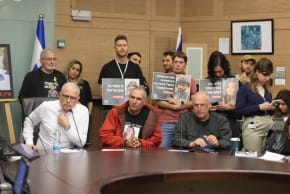Benjamin Netanyahu
Mistrust of Trump is reshaping the global order - opinion
Global trust in America is eroding while erratic leadership, private power, and strategic uncertainty are reshaping the world order.


Netanyahu to meet Trump in Washington to discuss US-Iran talks

Will Israel’s Arabs reach the political Promised Land? - opinion

Former Moscow rabbi says he rebuffed proposal to convert Russians discussed in Epstein recording
Netanyahu says Epstein’s ties to Ehud Barak prove he worked against Israel, not in favor
Prime Minister Netanyahu claimed that Barak was engaging in activities that undermined Israel’s government, doubling down on jabs made last year on the former prime minister.

Supermajority of Israeli Arabs support re-establishing Joint List for Knesset elections, poll shows
A new poll by ArPanel reveals strong backing among Israeli Arabs for a unified Joint List, with 82% in favor and a clear preference for new candidates in the upcoming Knesset election.

Latest Epstein files release unleashes wave of antisemitic conspiracy theories on social media
Some of the emails also show Epstein referencing the High Holidays and deploying Jewish phrases like “goyim” in a disparaging manner.

Unnamed Prime Minister's Office official accused of 'inapropriate conduct' with a woman - KAN
According to the KAN report, police have been in contact with the alleged victim of the conduct to file a complaint against the unnamed official.

Lapid: Netanyahu ignored repeated warnings in days leading up to Oct. 7 massacre
Former defense minister Yoav Gallant responded also the newly published documents in a post on X, accusing the prime minister of lying about the activities of the defense establishment.

Netanyahu releases pre-Oct. 7 intel documents, claims defense echelon urged keeping Hamas in power
The documents, spanning from February 2023 to an hour before attack, show how Israel's defense echelon misread Hamas’s intentions, and characterized the terror group as deterred.

Jerusalem removed hotel land plan from agenda after Oct. 7 families protested
The families cited a US civil lawsuit that alleges the project is linked to Bashar al-Masri, a Palestinian-American businessman accused in court filings of aiding Hamas.

Was Israel honest about the war's past, Gaza's future?
Unpack the latest developments in the Gaza ceasefire and the mounting frustrations of hostage families in a post-war world.

Benjamin Netanyahu: October 7 massacre was an 'intelligence failure, but not a betrayal'
On Iran, Netanyahu told the Knesset's defense committee that Israel would "respond with force never before seen" should the Islamic Republic choose to carry out strikes against Israeli targets.

Iran’s supreme leader tells Eretz Nehederet he’s bored of bingeing TV in his bunker
Eretz Nehederet shifted focus from Trump to a bunker-bound Khamenei, mocking Iran-US tensions, Israeli defense systems, and domestic politics amid mounting war anxiety.
